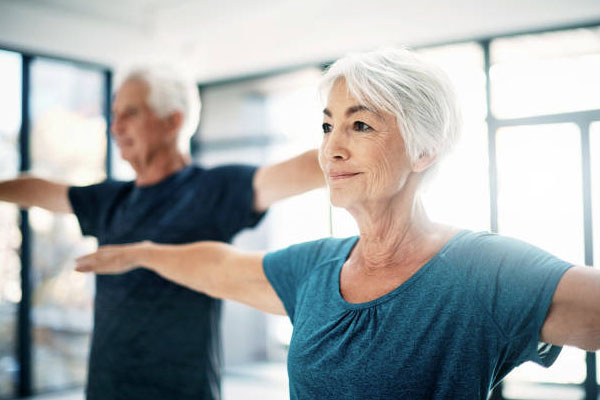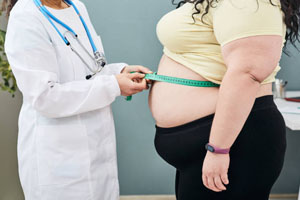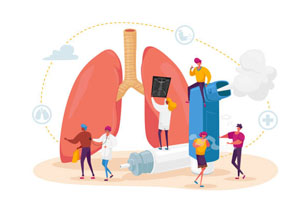Discover the secrets to maintaining vitality and well-being as you age Explore the physical and mental benefits of staying active, overcome the challenges of aging, and learn practical tips for a healthier, more fulfilling life Start your journey towards aging gracefully today
As you journey through the different phases of life, maintaining a healthy and active lifestyle becomes increasingly important. It's not just a matter of adding years to your life but adding life to your years. With age, there may be physical and mental changes, but these changes should not deter you from staying active and healthy. In fact, they make it all the more essential.
Age is not a barrier to leading an active and fulfilling life. Whether you're in your fifties, sixties, or beyond, there are numerous strategies, exercises, and lifestyle choices that can help you maintain your vitality and well-being. This comprehensive guide will explore the physical and mental benefits of staying active, the challenges that aging and inactivity can present, and offer practical tips for incorporating healthy habits into your daily routine.
We'll delve into age-appropriate exercises that cater to your unique needs and abilities, ensuring that you can engage in physical activities without the fear of overexertion or injury. In addition, we'll discuss the importance of maintaining a healthy diet, getting adequate rest, and managing stress. All of these elements combine to create a holistic approach to aging gracefully while staying active and healthy.
Join us on this journey towards a vibrant and fulfilling life in your later years. It's never too late to start or continue your quest for an active, healthy, and joyful existence.
Welcome to a journey towards a healthier and more active life as you age. In this article, we will explore the key strategies and insights on how to stay active and maintain your health as you grow older. Aging is a natural part of life, but it doesn't mean you have to compromise your well-being. Whether you're approaching your golden years or already enjoying retirement, it's never too late to adopt a lifestyle that promotes vitality and longevity.
As we delve into this topic, we'll discuss the physical and mental benefits of staying active, the challenges that aging can bring, and practical tips for incorporating healthy habits into your daily routine. We'll also provide guidance on age-appropriate exercises and ways to create a balanced, holistic approach to aging gracefully.
So, let's embark on this journey together, empowering you to make the most of every stage of life, ensuring that age is just a number, not a limitation.

Benefits of Staying Active and Healthy
Physical Benefits of Staying Active
Regular physical activity has a multitude of advantages for individuals as they age. These include:
- Improved cardiovascular health, reducing the risk of heart diseases.
- Enhanced muscle strength and flexibility, aiding in daily tasks and reducing the likelihood of injuries.
- Better joint mobility and reduced risk of arthritis.
- Weight management, helping to maintain a healthy body weight.
- Increased bone density, reducing the risk of osteoporosis.
- Improved balance and coordination, which can prevent falls and fractures.
Mental and Emotional Benefits
Being active also has a profound impact on mental and emotional well-being:
- Reduced stress and anxiety, leading to better mental health.
- Enhanced cognitive function and memory retention.
- Elevated mood and a decreased risk of depression.
- Increased self-esteem and confidence.
- Social engagement, providing a sense of belonging and reducing feelings of isolation.
- A sense of purpose and fulfillment as you pursue a healthy lifestyle.
These physical, mental, and emotional benefits underscore the importance of staying active and healthy as you age, contributing to a higher quality of life and overall well-being.
Challenges of Aging and Inactivity
Physical Challenges
As we age and become less active, various physical challenges may arise:
- Reduced muscle mass and strength, leading to difficulties in performing daily activities.
- Decreased bone density, increasing the risk of fractures and osteoporosis.
- Joint stiffness and decreased flexibility, which can limit mobility.
- Slower metabolism, making it harder to maintain a healthy weight.
- Higher risk of chronic conditions such as heart disease, diabetes, and hypertension.
- Greater susceptibility to falls and related injuries.
Mental and Emotional Challenges
Inactivity and aging can also pose mental and emotional challenges:
- Increased risk of cognitive decline, including memory problems and cognitive disorders.
- Higher levels of stress and anxiety, impacting mental well-being.
- Greater likelihood of depression and feelings of isolation due to reduced social engagement.
- Lower self-esteem and confidence, affecting overall happiness.
- Loss of a sense of purpose and fulfillment, which can lead to dissatisfaction with life.
Understanding and acknowledging these challenges is crucial for individuals as they age. It emphasizes the importance of staying active and engaging in healthy habits to mitigate these issues and maintain a high quality of life.
Tips for Staying Active
Regular Exercise Routine
Establishing a regular exercise routine is fundamental to staying active:
- Set achievable fitness goals that are specific, measurable, and time-bound.
- Choose exercises you enjoy, whether it's walking, swimming, or dancing, to keep motivation high.
- Vary your workout routine to prevent boredom and engage different muscle groups.
- Include strength training, cardio, and flexibility exercises to maintain a balanced fitness regimen.
- Schedule exercise sessions and stick to a consistent timetable to build a healthy habit.
Healthy Diet Choices
Nutrition plays a vital role in your ability to stay active and healthy:
- Consume a well-balanced diet rich in fruits, vegetables, whole grains, lean proteins, and healthy fats.
- Avoid excessive processed foods, sugary snacks, and high-sodium meals that can impact your energy levels negatively.
- Stay hydrated by drinking an adequate amount of water throughout the day.
- Consider consulting a nutritionist for personalized dietary recommendations based on your needs and goals.
Importance of Rest and Sleep
Rest and sleep are crucial components of an active and healthy lifestyle:
- Ensure you get 7-9 hours of quality sleep each night to support overall well-being.
- Allow your body to recover after exercise to prevent overexertion and injury.
- Incorporate relaxation techniques such as meditation or deep breathing to reduce stress and promote better sleep.
- Listen to your body; if you feel fatigued or sore, give yourself time to rest and rejuvenate.
These tips form the foundation for an active and healthy lifestyle as you age. Combining regular exercise, proper nutrition, and adequate rest can help you maintain your vitality and well-being throughout the years.
Stay Active with Age-Appropriate Exercises
Strength Training
Strength training is essential for maintaining muscle mass and bone density:
- Consider bodyweight exercises, resistance bands, or light dumbbells to build and tone muscles without overexertion.
- Focus on major muscle groups like legs, arms, chest, and back to support functional strength and balance.
- Perform strength exercises 2-3 times a week with appropriate rest days in between to allow muscles to recover.
- Engage in proper warm-up and cool-down routines to reduce the risk of injury.
Aerobic Exercises
Aerobic exercises improve cardiovascular health and stamina:
- Choose low-impact options like brisk walking, swimming, or stationary biking to protect joints while boosting endurance.
- Gradually increase the duration and intensity of aerobic workouts over time as your fitness level improves.
- Aim for at least 150 minutes of moderate-intensity aerobic activity per week, or 75 minutes of vigorous-intensity exercises.
- Include activities that elevate your heart rate, like dancing or gardening, to keep workouts engaging.
Flexibility and Balance Exercises
Flexibility and balance exercises help prevent falls and injuries:
- Incorporate gentle stretching routines to improve flexibility, targeting major muscle groups and joints.
- Practice balance exercises like tai chi or yoga to enhance stability and reduce the risk of falls.
- Use aids such as a chair or wall for support when working on balance exercises, gradually reducing dependency as you progress.
- Perform these exercises at least 2-3 times a week to maintain and improve flexibility and balance.
Age-appropriate exercises are essential for staying active without risking injury. This section provides guidance on strength training, aerobic exercises, and exercises that improve flexibility and balance, allowing you to maintain a healthy and active lifestyle as you age.
Healthy Aging Lifestyle
Stress Management
Effectively managing stress is vital for a healthy aging lifestyle:
- Practice stress-reduction techniques like deep breathing, meditation, or mindfulness to promote relaxation and emotional well-being.
- Engage in activities you enjoy, whether it's reading, art, or spending time in nature, to alleviate stress and improve your overall mood.
- Seek social support from friends and family or consider talking to a mental health professional if stress becomes overwhelming.
- Maintain a work-life balance and set boundaries to prevent excessive stress from professional responsibilities.
Regular Health Checkups
Regular health checkups are crucial for monitoring your well-being as you age:
- Schedule routine medical and dental checkups to catch and address health issues early, ensuring timely intervention if needed.
- Discuss age-specific health concerns with your healthcare provider, such as cancer screenings, bone density tests, and cholesterol checks.
- Review and update medications and vaccinations as recommended by your doctor to maintain your overall health.
- Stay informed about your family's medical history to understand potential genetic risks.
Social Engagement
Staying socially engaged is a significant component of a healthy aging lifestyle:
- Participate in social activities, join clubs, or volunteer to maintain a sense of purpose and interaction with others.
- Connect with friends and family regularly, whether in person, through phone calls, or via video chats to combat feelings of isolation.
- Engage in intergenerational activities that allow you to interact with people of various age groups, fostering a sense of belonging and learning opportunities.
- Consider group fitness classes or sports activities to combine socializing with physical activity, promoting overall well-being.
A healthy aging lifestyle encompasses stress management, regular health checkups, and social engagement. By prioritizing these aspects, you can enhance your emotional and physical well-being as you age, leading to a more fulfilling and active life.
FAQs
Q1: What are the key physical benefits of staying active as you age?
A1: Staying active as you age provides numerous physical benefits, including improved cardiovascular health, increased muscle strength and flexibility, better joint mobility, weight management, increased bone density, and improved balance and coordination.
Q2: How can staying active in older age contribute to better mental and emotional well-being?
A2: Staying active has a positive impact on mental and emotional well-being. It can reduce stress and anxiety, enhance cognitive function, elevate mood, boost self-esteem, promote social engagement, and provide a sense of purpose and fulfillment.
Q3: What are some age-appropriate exercises for maintaining fitness as you age?
A3: To maintain fitness as you age, consider incorporating strength training exercises, such as bodyweight exercises or light dumbbells, aerobic exercises like brisk walking, swimming, or stationary biking, and flexibility and balance exercises like stretching routines and practices such as tai chi or yoga.
Q4: How can I effectively manage stress to support a healthy aging lifestyle?
A4: Effective stress management can be achieved through techniques such as deep breathing, meditation, or mindfulness. Engaging in enjoyable activities, maintaining a work-life balance, and seeking social support are also key strategies to manage stress effectively.
Q5: Why are regular health checkups important for healthy aging?
A5: Regular health checkups are essential for monitoring your well-being as you age. They help catch and address health issues early, discuss age-specific health concerns, update medications and vaccinations, and stay informed about your family's medical history to understand potential genetic risks.








